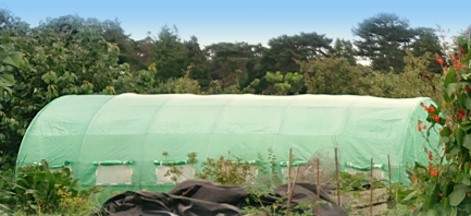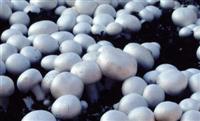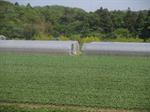Develop your skills and knowledge in the management of horticultural crops
 Learn about the structure and operations of horticultural enterprises.
Learn about the structure and operations of horticultural enterprises.- Learn about horticultural marketing - planning, research, methods and strategies.
- Learn about the classification, structure and biology of plants.
- Learn about cultivating plants in protected environments.
- Develop your knowledge of methods of pest, disease, and weed control.
- Learn about lipids, proteins, enzymes, nitrogen, the nitrogen cycle, photosynthesis, respiration, transpiration, assimilation, pH, chemical analysis and much more.
 Be able to describe and evaluate environmental controls used in protected environments.
Be able to describe and evaluate environmental controls used in protected environments.- Learn about soils - assess their characteristics, understand approaches to improving soil quality.
- Learn about the operation of machinery and understand the selection of tools appropriate to tasks.
- Understand issues affecting the horticulture industry today.
- Develop research skills to identify emerging trends in horticulture.
 Develop your abilities to assess and write about research findings.
Develop your abilities to assess and write about research findings.- Choose modules from a selection of Electives, to focus your studies on areas of specific relevance to your study goals, including selections of plant types, hydroponics, and further studies in engineering - learning basic principles and techniques of surveying, water management, machinery used for chemical applications and more.
- Undertake a 100 hour Work Experience or Problem Based Learning projects to test and develop your ability to apply what you have learned.

AFTER YOUR STUDIES
The crop production industry has changed a lot in recent years and will no doubt be different after you complete this course, than what it is when you commence.
Nevertheless, one thing will not change: we still need to grow crops, to produce the food we eat, and a wide range of other products we use in our daily life.
There are different ways of growing crops, and we prepare you to work in any or all of these industry sectors:
- On large farms or small.
- Using organic methods, hydroponics, traditional or other practices.
- With controlled environments (e.g. in greenhouses), or outside, exposed to the elements.
- In any climate, dry or wet, cold or hot, humid or anything else.
Some graduates will be farmers, and others may become involved in enterprises that support the industry, which are becoming more varied all of the time. Crop enterprises provide everything a grower needs to be successful (e.g. machinery, tools, seed, fertiliser, pest control, irrigation, laboratory services, consultancy, marketing, transport, crop storage and processing, research, education and more).
As the industry evolves, opportunities keep shifting. At one stage, everything that we ate was grown close to home. This is often not the case today, but there are always advantages to produce being fresh. As people have become better educated and awareness has grown, the demand for locally grown product has increased.
Our courses train you to be flexible and adaptable in your approach to working in crop production - which ensures your learning remains relevant in today's changing environment.
GREENHOUSES
Horticultural crops are not just fruit and vegetables, but also herbs, cut flowers and even nursery plants. You may think that horticultural crops are something to be grown in the ground, outside in large paddocks. Many are (or can be). Others may be grown inside protected structures, or in containers. When a crop is containerised or grown in a greenhouse, there can be a greater degree of control over the growth of the plant. That can give the grower a real advantage.
Controlled growing can be more costly, but it is also more intensive. More can be produced with less land. The additional cost of production may well be more than offset by the savings in land costs.
Greenhouses can be useful in any garden or climate, but particularly over the cooler months of late autumn and winter, allowing you to grow some vegetables and herbs out of season.
Uses for a Greenhouse in a Cold Climate
- Extend the growing season of vegetables or flowers.
- Propagation.
- Protect plants over winter.
- Grow tropical or sub-tropical plants (e.g. palms/African violets, etc) all year.
- To over winter tender pot plants.
- Allows you to continue gardening in miserable weather.
- Hydroponics.
Uses for a Greenhouse for in a Warm Climate
- Allows you to grow summer plants in winter.
- Protection from cold nights – evens out the temperature.
- Propagation.
- Provide a cooler protected environment (with a cooling system and or shading).
- Provides a uniform humidity level for tropical plants.
- Hydroponics.
The Right Greenhouse
There are many different types of greenhouses available today. Generally speaking, the old adage applies: “You get what you pay for”. Cheaper greenhouses are not as efficient or as long-lasting as more expensive types, which can last decades and will in many respects do a better job even if more costly initially.
Heating
The greenhouse is itself a type of solar heater, but even so in winter an unheated greenhouse can get quite cold inside. Heaters are sometimes used, particularly during extremely cold weather, but an electric or fuel heater can quickly become expensive to use even in a small greenhouse. If you have a large area and need to heat it a lot, then a purpose built heating system may be unavoidable.
Another method of storing energy for greenhouses is to use heat-storing materials such as water or rocks. The material heats up slowly during the heat of the day, and then releases its heat slowly during the night, modulating temperature fluctuations. Solar heat banks may be a cheaper long term solution to store that extra energy.
Greenhouses that have glass right to the ground (longwall types), will let more light in, but can cool down and heat up faster. Houses that have brick or other solid materials for the bottom part of the wall (i.e. shortwall types) are going to be more insulated from the outside cold. Solid brick can act as a heat bank, keeping plants a little warmer when night temperatures drop very low over winter.
Light
Lights are great for extending the growing hours in the day. Some plants will only grow well and flower once daylight hours reach a certain optimal point. Providing the right environment is more than just keeping plants warm.
For example: beetroot, silver-beet, spinach, lettuce, potatoes, dill and peppermint (and many more vegetables and herbs) all need long days (more than 12 hours light) in order to grow well.
Tomatoes, corn, cucumbers, some strawberry species, Brussels sprouts, cabbages and kale on the other hand are day-neutral so can be grown if given warmth, throughout the year – however they too will flower better with stronger and longer light.
Watering
Hand-watering is a good method for a small greenhouse and also allows you to monitor your plants more effectively for pests and disease problems. For a larger greenhouse you may need an automatic irrigation installed; once set you do not need to tend your plants each day – but remember to watch for evidence of disease which can very quickly turn a good crop into dead plants!
Planting Containers
- Grow bags – cheap and easy to move around (they usually have handles).
- Large pots – easy to move and a good way to have better control over disease.
- Beds in the ground – useful in poly tunnels, usually two beds with a central path.
- Raised beds built inside the greenhouse.
- Hydroponic systems.
- Hanging baskets – great to extend space and ideal for herbs and leafy vegetables.
- Bench top trays and containers – easy to reach (use under bench space as storage.
A Foundation in Crop Production
This course provides such a comprehensive foundation in crop production that it can really set you up for a diverse, professional career path in the industry.
The Advanced Diploma in Horticulture (Crops) is available to start at any time. You study by distance learning, with the support and guidance of our highly knowledgeable expert tutors. Although you study by distance learning, the course includes many practical elements to aid and test your learning.
If you have any questions about the course, or about how it fits in with your planned goals, please get in touch with our specialist tutors today. They will be happy to answer your questions and look at the different study options open to you.